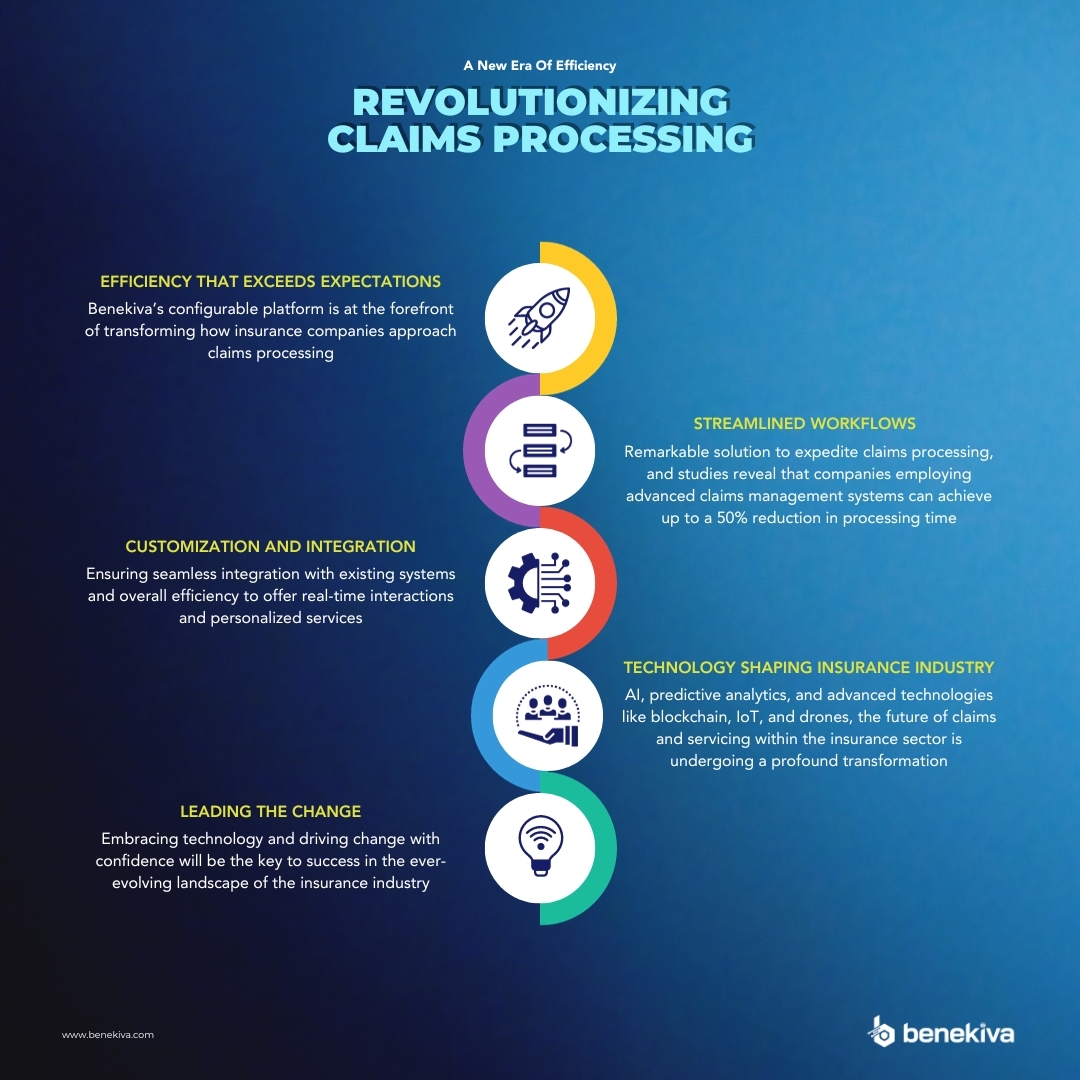In the complex world of insurance, the operations within carriers have often lagged behind in technology and operational optimization. However, the claims process is where carriers fulfill their promises to policyholders and dedicate a significant portion of their operational costs – from claim preparation to processing, payment, and adjustments. This process lies at the heart of the insurance experience, profoundly influencing carrier differentiation, brand perception, asset retention, and stakeholder experience.
Studies reveal that a staggering 87% of policyholders claim that their experience with the claims process directly impacts their choice to remain loyal to an insurance provider. Therefore, delivering an exceptional claims experience is paramount in retaining policyholders and attracting new ones.
At Benekiva, we understand the significance of claims automation in revolutionizing the insurance landscape. Our configurable platform has been meticulously designed to deliver unparalleled efficiency, effectiveness, and client satisfaction. Let’s delve into how our cutting-edge technology is reshaping the claims processing experience and supporting the integration of key technology trends shaping the insurance industry.
Efficiency That Exceeds Expectations
Did you know that 61% of consumers prefer digital tools to monitor their claims processing and application status? Benekiva’s configurable platform is at the forefront of transforming how insurance companies approach claims processing. It empowers insurers to achieve the pinnacle of efficiency, enhancing the entire claims journey.
Our innovative solution ensures an end-to-end process that encompasses automated data entry, intelligent workflows, document management, and real-time analytics. This not only accelerates processing times but also significantly improves accuracy, reducing the risk of errors or fraud.
Streamlined Workflows
In the era of manual processes, insurance companies often struggle to manage tasks and distribute work efficiently. Policyholders today demand complete transparency and swiftness, which manual claims processing can no longer provide. Streamlined workflows offer a remarkable solution to expedite claims processing, and studies reveal that companies employing advanced claims management systems can achieve up to a 50% reduction in processing time.
Benekiva’s configurable platform optimizes workflows in multiple ways:
- Tasks are intelligently assigned to the appropriate personnel, ensuring efficient distribution and minimizing bottlenecks or delays.
- Insurers can tailor workflows to their unique business processes and requirements.
- Visual representations of workflows enable users to easily track the progress of each claim.
- Automation populates relevant information from policy documents, claim forms, and external databases, reducing errors and saving valuable time.
- Task prioritization based on value and staffing levels meets service delivery goals, while process analysis provides insight and fosters efficiency.
- Efficient document management is facilitated through a centralized repository for all claim-related documents.
- Centralized communication platforms streamline updates, information requests, and query resolutions, enhancing efficiency and reducing communication gaps.
- These enhancements translate into a streamlined claims process that boosts operational efficiency, hastens resolution times, and augments customer satisfaction.
Customization and Integration
Insurance companies can tailor our platform to their specific needs. They can define rules, workflows, and data fields to match their processes, ensuring seamless integration with existing systems and overall efficiency. According to a study by PwC, 73% of customers expect insurance companies to offer real-time interactions and personalized services.
Benekiva’s configurable platform empowers insurers to customize claims processing to their unique business requirements:
- Insurers can create and modify workflows to align with their claims processing procedures.
- Dynamic forms and templates can be customized to capture specific data fields and information pertinent to various types of claims.
- Rules and conditions can be set up to automate specific actions and decisions in the claims process.
- Data fields and forms can be customized to capture the precise information required for claims processing.
- Different access levels can be assigned to users based on their roles within the claims processing workflow.
- Customization of branding elements and user interface components is possible.
- This high degree of customization enhances efficiency, accuracy, and compliance, ultimately elevating the overall claims processing experience for both insurers and policyholders.
Our platform seamlessly integrates with various data sources, enabling automated data entry and retrieval. Automation can reduce manual work by 80% and claims processing time by up to 50%. This eliminates the need for manual data entry and minimizes inaccuracies, while integration with document management systems ensures the efficient handling of claim-related documents.
Check this infographics for more information:

Technology Trends Shaping the Insurance Industry
With the insurance landscape rapidly evolving, driven by AI, predictive analytics, and advanced technologies like blockchain, IoT, and drones, the future of claims and servicing within the insurance sector is undergoing a profound transformation. In this digital age, embracing technology is not just an option; it’s a necessity.
In this dynamic environment, we must all embrace a forward-thinking mindset. Insurers need to function like partners to their policyholders and claimants in safeguarding lives and well-being. The future demands that we reimagine how we serve our policyholders, how we process claims, and how we harness the power of automation and artificial intelligence.
Automated Underwriting:
Traditional in-person evaluations are making way for automated underwriting processes. Leveraging tools like robotic process automation (RPA) and artificial intelligence, insurers are streamlining information gathering, reducing human touchpoints, and ensuring data accuracy, ultimately delivering more efficient underwriting decisions.
Automated Claims:
Digitization and AI-driven claims processing are revolutionizing the industry. Digital claims have significantly reduced processing times and enhanced customer satisfaction. Machine learning plays a pivotal role in automating claims processing, improving speed, accuracy, and cost-effectiveness.
Enhanced Customer Trust:
While technology adoption is on the rise, customer trust remains paramount. Insurance companies must establish trust by increasing points of contact with customers. Timely communication and human interaction options are essential to reassure claimants and policyholders.
Virtual Assistants (Chatbots) and NLP:
Chatbots are becoming integral in customer interactions, but striking the right balance between automation and human intervention is crucial. Quality digital assistants are set to save costs and enhance customer experiences.
Machine Learning for Fraud Detection:
Fraud detection is a top concern for insurers. Machine learning, with its data analysis capabilities, is being employed to prevent fraudulent claims effectively. However, insurers must customize models based on context to maximize their benefits.
Drones and Robotic Insurance Technology:
Drones and robotics are entering the insurance industry to improve risk assessment and claims efficiency. They enable remote data collection, reducing the need for physical inspections.
Cloud Computing:
Cloud adoption is gaining traction, enabling insurers to leverage data for more accurate underwriting, claims processing, marketing, and sales. However, a shared responsibility model for cloud security must be implemented effectively.
Digital Distribution and Self-Service:
The pandemic accelerated the shift toward digital distribution and self-service portals, meeting evolving customer preferences for remote interactions.
Data-First Insurtech Ecosystems:
Insurers are building data-driven ecosystems, leveraging APIs, microservices, and IoT devices to provide personalized experiences and stay competitive in an evolving market.
As the insurance industry continues to evolve, staying informed about these trends and their implications is crucial for carriers looking to thrive in this dynamic landscape. 2025 is the new 2030, and there’s an acute urgency to adapt, evolve, and excel. The carriers engage with their customers, the services provided, and the experiences delivered will define our collective success. Let’s leverage technology not just to keep pace but to set new standards of excellence.
Leading the Change
Carriers need to be open to new technology and manage change within their internal leadership. They must be open to different shifts in the way that things are done and to lead without fear. Embracing technology and driving change with confidence will be the key to success in the ever-evolving landscape of the insurance industry. Benekiva’s configurable and flexible platform is here to support carriers in testing and integrating these transformative technologies, ensuring they remain at the forefront of innovation while delivering exceptional claims experiences to claimants.









